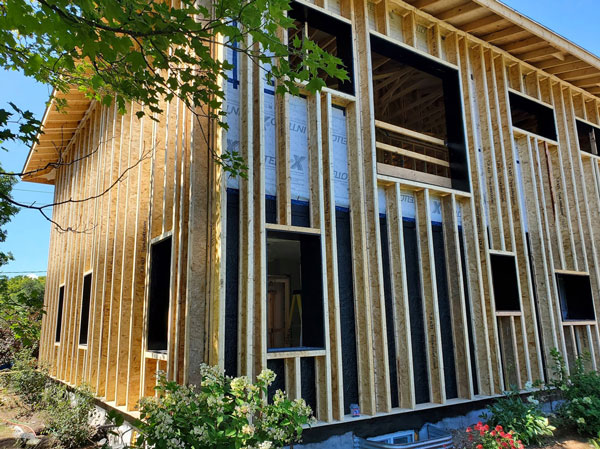The initial public review period in the 2020-2025 National Building Code (NBC) development cycle drew to a close at the end of April.
Energy efficiency advocates like Passive House Canada (PHC) and Efficiency Canada are generally supportive of what has come forth so far.
This includes improved air tightness, an energy-efficiency intensity compliance path, carbon reduction, continued tiered code adoption and support for municipalities as they seek to elevate building performance and emissions reductions, particularly through advancing green development standards.
“These changes represent a progressive shift towards performance-based standards, which, if widely adopted, could substantially decrease the operational emissions associated with new and retrofitted buildings,” PHC recently wrote in its newsletter.
However, PHC did express concerns regarding the “uneven requirement for airtightness testing, multiple compliance pathways that keeps the door open to reduced performance, a lack of ambitious sunsetting of high emitting energy systems, a lack of improvement in energy efficiency in the lower tier and the voluntary nature of advanced tiers.”
PHC and Efficiency Canada also disagree with a proposal that, “includes a points system where high GHG sources, such as gas heaters, are awarded points equivalent to more efficient technologies like heat pumps.”
“If the goal of the net-zero emissions code is indeed to decarbonize the buildings sector, there will be a substantial role for the use of low-emissions electricity heat pumps that produce fewer emissions than gas alternatives,” says Efficiency Canada.
The NBC also still runs a blend of prescriptive and performance standards.
PHC suggests, “multiple pathways complicate the compliance process and could lead to inefficiencies and redundancies in the design process by requiring multiple models for different aspects of the same project.”

met with both cautious optimism and skepticism.
Performance-based code structures will deliver results superior to prescriptive measures, it says.
The homebuilding industry appears concerned about costs more than energy efficiency.
Richard Lyall, president of the Residential Construction Council of Ontario (RESCON), claims energy efficiency measures add to costs without any substantial return on that investment. To prove his point, he cites a study, undertaken by RESCON and Ontario new home builder Country Homes back in 2021.
Two halves of a semi-detached home were analyzed. One half was “an all-electric home designed and built to the Canadian Home Builders’ Association NetZero energy (NZE) program”; the other half was “a low-carbon home utilizing fuel-switching, combination hybrid gas and electric heat.”
However, some cost conclusions were misleading. For example, solar panels added significantly to the price of the NZE home. However, renewables like solar are not a requirement of the “NZE-ready” standard in the current national model codes.
Overall, Lyall would prefer to lower code ambitions and slow the pace of any development.
“Moving too far beyond the current building code requirements for energy efficiency measures can result in a negative return on investment,” he writes. “Moving too quickly in adopting energy efficient measures without proper consideration of the merits could lead to other problems.”
He speaks specifically of skilled trade shortages.
“The push for more energy efficiency measures in new homes could be the straw that breaks the camel’s back.”
But as Efficiency Canada explains: “The end goal of Canada’s 2020 national model codes is that all new buildings will be built to net-zero energy-ready standards by 2030.”
That leaves ample time for builders, associations and governments to share best practices on how to cost-effectively achieve that standard in the coming years.
In any case, Lyall asserts Ontario’s new homebuilders, “are already leaders and a decade ahead of other provinces when it comes to energy-efficient practices,” despite what he describes as “crippling taxes, fees and levies.”
Yet, Ontario has not adopted the NBC tiered approach and still operates under 2017 NBC provisions. This denies builders a predictable regulatory and cost-effective path to eventually meet the NZE-ready standard in 2030, and for the supply chain to forecast future demand for higher performing products.
Reduced regulatory uncertainty would help control new housing costs. After all, that is what Lyall is talking about.
John Bleasby is a Coldwater, Ont.-based freelance writer. Send comments and Climate and Construction column ideas to editor@dailycommercialnews.com.



Recent Comments
comments for this post are closed